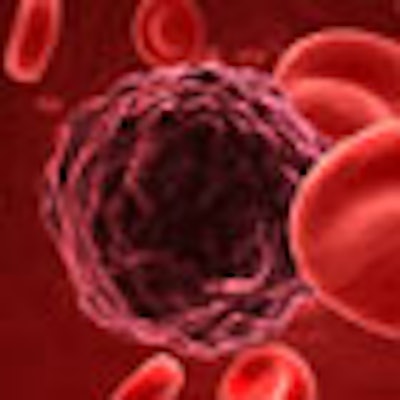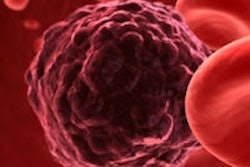
While cancer survival rates are improving, common cancer therapies such as chemoradiation often cause acute oral complications and toxicities that are largely unavoidable, according to a study in CA: A Cancer Journal for Clinicians (November/December 2012, Vol. 62:6, pp. 400-422).
Increased awareness and aggressive management of oral toxicities are needed to ensure the long-term oral health and well-being of cancer patients, according to the study authors, led by Joel B. Epstein, DMD, MSD, director of oral health services at City of Hope cancer center.
"Although some of the acute oral toxicities of cancer therapies may be reduced, they remain essentially unavoidable," they wrote.
Dr. Epstein and colleagues reviewed several advances in cancer therapies, including surgery, chemotherapy, radiation therapy, hematopoietic cell transplantation, and minimally invasive surgery for head and neck cancers such as transoral robotic surgery and transoral laser microsurgery.
For cancer patients undergoing treatment, acute oral complications include mucositis, infection, and saliva and neurosensory changes, the researchers noted. Complications in survivors include neurosensory changes; saliva, taste, and functional changes; oral and dental infection; and risk of dental disease and necrosis of the jaw.
"Oral toxicities may be severe and protracted, and thus preventive and ongoing oral healthcare is important," the authors wrote.
Mucositis
One of the most commonly reported oral side effects in cancer patients undergoing treatment is mucositis. Traditional chemotherapy drugs, such as fluorouracil, methotrexate, and doxorubicin, can cause acute mucositis, the study authors noted.
Chemotherapeutic agents such as antimetabolites and alkylating agents produce severe mucositis, and combination chemotherapy and dose-intense regimens also can induce mucositis. Newer targeted agents such as epidermal growth factor receptor, mammalian target of rapamycin, and tyrosine kinase inhibitors also are associated with mucositis. And chemotherapeutic drugs such as etoposide and methotrexate are secreted in saliva and cause mucositis.
What can dental practitioners do to help? Comprehensive dental exams to detect infections, educating patients about oral hygiene, and using bland oral rinses are part of the basic care for patients at risk for mucositis, the researchers noted. In addition, oral rinses without alcohol, such as baking soda and salt solutions, may help. Research suggests that topical steroids also can be used to manage isolated ulcerations.
Here are some other recommendations for managing mucositis in cancer patients:
- Aqueous chlorhexidine lowers oral infections such as gingivitis and candidiasis, and may reduce overall microbial load.
- Cryotherapy is recommended to prevention mucositis for patients taking high-dose melphalan.
- Keratinocyte growth factor, which promotes epithelial cell repair, has reduced mucositis.
- Low-energy laser reduces the severity of mucositis and may impact tumor necrosis factor production.
- In patients undergoing radiation therapy for head and neck cancer, benzydamine can prevent radiation-induced mucositis.
Hyposalivation and xerostomia
Another common side effect of cancer treatment is diminished saliva production, which increases the risk of dental demineralization, caries, and oral infections such as candidiasis. In fact, most of the dental complications in cancer patients are due to saliva production and function.
For example, salivary tissue is sensitive to radiation therapy, and cumulative doses greater than 30 Gy can permanently damage salivary glands, the researchers noted. Radiation therapy causes xerostomia because it damages the epithelial and connective tissue of salivary glands and also damages salivary acini and ducts, which affects saliva production, they explained. Salivary functions may recover once treatment is completed, but the damage is usually irreversible, and late-effect xerostomia is a common complaint of patients, according to the study authors.
3D radiation therapy planning, pharmacologic agents, and surgery have been used to minimize salivary gland damage from this treatment approach, they noted. In addition, studies have shown that amifostine results in a modest but significant decrease in late xerostomia in patients undergoing radiation therapy.
In patients undergoing high-dose chemotherapy with hematopoietic cell transplantation, graft-versus-host-disease-related xerostomia also can occur. Treatments include prednisone and cyclosporine, cytokine blocking agents, antimetabolites, cytotoxic antibodies, and new prophylaxis strategies, according to the authors.
They offer several suggestions for dental practitioners working with these patients. For example, patients should be told that dry mouth is a symptom of systemic dehydration and that drinking large quantities of fluid will not relieve xerostomia. Milk may help because it moisturizes, lubricates, and buffers acids while contributing to enamel remineralization because of its calcium and phosphate.
Demineralization, which can be aggravated by a chronic lack of saliva, may result in advanced periodontal disease and osteoradionecrosis, the authors noted. Therefore, diseased teeth, soft tissue, or bone should be treated prior to cancer therapy. This is particularly crucial for head and neck cancer patients undergoing radiation therapy. Calcium, phosphate, and fluoride are needed for remineralization, and if resting saliva is reduced, these minerals should be supplied through oral care products.
Periodontitis and oropharyngeal candidiasis also are common during cancer treatment. Topical antifungals reduce oral colonization and can reduce subsequent local and systemic infection, they noted.
Other complications
The study authors identified several other complications commonly encountered in immunocompromised patients, and offered some treatment recommendations:
Orofacial infection from herpes viruses: Herpes vaccinations and antiviral prophylaxis are good preventive therapies during hematopoietic cell transplantation.
Osteoradionecrosisis: This is caused by the failure of the mandible to heal following radiation therapy. It can be prevented by a comprehensive dental evaluation and treatment prior to therapy. Treatments include optimizing oral hygiene, controlling infection with chlorhexidine rinses and systemic antibiotics, nutritional support, removing devitalized tissue, and reducing dental extractions through preventive dental care, endodontics, and crown amputation.
Oral pain: Some 85% of head and neck cancer patients have oral pain, and they say it is the worst part of cancer therapy, resulting in a significant decrease in their quality of life, the researchers noted. Mucositis is the most common and distressing cause of pain in patients who have radiation therapy for head and neck cancers. Opioid analgesics are the primary medication to manage pain due to cancer and its treatment. To manage pain, physicians should also address nociceptive and neuropathic pain, with treatments for the pathophysiology of cancer pain, the authors noted. Cannabinoids also are helpful for pain management.
Trismus: Trismus, the inability to open the mouth normally, can result from high-dose radiation exposure to the temporomandibular joint region. Active/continuous motion devices are effective treatments and should be provided as preventive protocols. Tongue depressors have been used to mobilize the jaw, although there is a risk of excessive load to the teeth.
Taste disorders: These are common in head and neck cancer patients; their loss of umami (savory taste) is often one of the things they say contributes to decreased quality of life, the researchers noted. Zinc supplements have been shown to help improve taste following cancer therapy. In addition, patients who took dronabinol (tetrahydrocannabinol) reported improved taste and increased appreciation of food and a significant increase in appetite.
Being aware of these complications is important for clinicians involved in cancer treatment and follow-up care of cancer patients so appropriate and timely measures can be taken. Prevention and management is best provided by multidisciplinary healthcare teams, the authors noted.
"The significant impact of long-term complications requires increased awareness and recognition to promote prevention and appropriate intervention," they concluded.



















